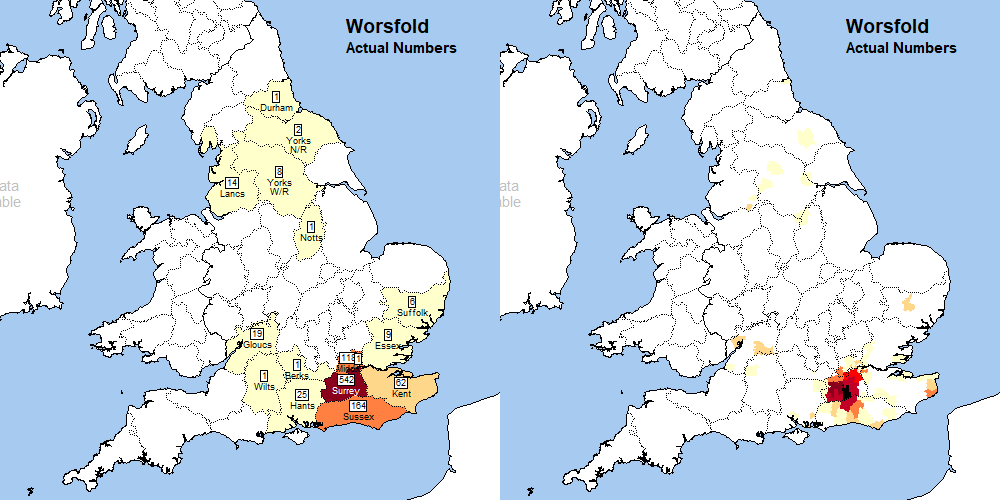Surname Origins, no. 6: Worsfold
Worsfold is a surname found chiefly in Surrey. In the 1881 Census, 542 of the 974 bearers of the name were to be found in that county, with a healthy showing in adjacent parts of Sussex too.
(Maps created using Steve Archer’s 19th Century Surname Atlas)
‘The Oxford Dictionary of Family Names in Britain and Ireland’ (P. Hanks, R. Coates & P. McClure, 2016) gives some early bearers of the surname:
Willelmus Worsefold, 1381 in Gomshall in Shere (Surrey)
Alice Worsfold, 1549 in Ockley (Surrey)
Stephen Worsfolde, 1561 in Cobham (Surrey)
Blanche Worsfold, 1571 in Rusper (Sussex)
John Worsfolde or Worsfoulde, 1572 in Warnham (Sussex)
These paint a pretty consistent picture in terms of both form and location. We can add Simon Worsefold, 1486–1515 (TNA C 1/140/27) in Abinger (Surrey), very close to the earliest bearer in Gomshall.
As for the etymology, ‘The Oxford Dictionary of Family Names’ explains Worsfold as a “locative name probably from a lost place in the west of Sussex or southern Surrey. Place-names with Old English fald, falod ‘fold, small enclosure for animals’, such as Ifold (Surrey), Winterfold (Surrey), and Cowfold (Sussex), are common here, but rare in the rest of England.”
All perfectly true. Some of those Surrey and Sussex places with ‘fold’ names have given rise to hereditary surnames, such as Upfold from Upfold Farm in Cranleigh (Surrey), Ashfold from Ashfold in Slaugham (Sussex), Reffold from Reffolds in Newdigate (Surrey), and Lickfold from Lickfold in Lodsworth (Sussex). As we saw with Blamire and Casemore in my earlier posts, there are times when a locative surname might outlast the place-name from which it sprang, and such is the case with Nettlefold, deriving from a now lost place in Dorking (Surrey), last recorded as Netilfold in 1609 (J. E. B. Gover, A. Mawer, & F. M. Stenton, ‘The Place-Names of Surrey’ (1934), p. 275).
So, where might Worsfold be? There’s no sign of such a place on current maps of Surrey and Sussex, or on the late 19th-century Ordnance Survey 6-inch maps, or in any of the documentation that I’ve been able to search. Whether it’s online catalogues or printed texts and indices, all the “Worsfold” hits turn out to be the surname, never a place-name, and nothing at all shows up before the late 14th century.
Time, then, for lateral thinking. Our earliest bearer is William Worsefold, recorded in the Poll Tax returns of 1381. That’s relatively late in linguistic terms, if we allow that some place-names containing the word ‘fold’ (Old English falod, Middle English fold) were surely coined before the Norman Conquest. A name could undergo considerable changes in a few hundred years. What Old English word (or, at least, what string of letters and sounds) might have yielded Wors- in a compound place-name by the late 14th century? One potentially useful approach is to look for other names that now start with Wors- and check their early forms and etymologies. There is, for instance, Worsted’s Farm in East Grinstead in Sussex whose development catches the eye: it is recorded as Wytherestede in 1257, Wirsted, Wyrstede in 1279, and Worsted in 1547 (A. Mawer, F. M. Stenton, & J. E. B. Gover, ‘The Place-Names of Sussex’, 2 volumes, 1929–30, p. 334). This shows a reduction of Wyther- to Wyr- to Wor- which involves the intervocalic loss of the voiced fricative /ð/ (i.e. the sound of the -th- in a word like ‘other’). There’s nothing unusual in such a reduction in the first element of a compound name – compare, say, Winton in Eccles parish in Lancashire, recorded as Wythinton in 1322, reduced to Wynton by 1535 (E. Ekwall, ‘The Place-Names of Lancashire’ (1922), p. 40). In the case of loss of /ð/ in Wyther-, well, once you’re left with a vowel (or diphthong) between w and r, pretty much anything goes. Initial w is likely to cause rounding of the following vowel, so, along with Wyr-, Wer-, and Wir-, the form Wor- is no surprise.
Let’s give it a go then. Cross fingers, search for a surname “W*th*r*s*f*ld”, and, guess what, our optimism is immediately repaid with…
Cecily de Wetheresfold, 1313 in Close Rolls (Surrey)
William de Witheresfold, 1332 in Subsidy Rolls (London)
[...] Wytheresfold, 1335 in Assize Rolls (Surrey)
Here we have a locative surname (the preposition de ‘of’ confirms it) recorded in Surrey in the early 14th century which either died out completely or, I suggest, developed into Worsfold. So now, armed with the form “W*th*r*s*f*ld”, we search for the place from which it came. As with “Worsfold”, there’s nothing on current or 19th-century maps of Surrey and Sussex, but medieval documents mention a place in Dunsfold parish (Surrey) called Wytheresfald in 1248, Wytheresfaud in 1279 (Assize Rolls), and Wytheresfold in 1320–1 (TNA SC 6/1011/27). This, surely, is what we were looking for! Dunsfold is in south-west Surrey, on the Sussex border, about ten miles from Gomshall where Willelmus Worsefold was taxed in 1381.
I can’t locate Wytheresfold precisely, as I can’t find any later mentions of it. Research into local field-names might shed more light. But at least I can offer a better explanation of Worsfold than “[probably] a locative name [probably] from somewhere in Sussex or Surrey”. It’s from a place called Wytheresfold which was in the parish of Dunsfold.
As for the etymology of the place-name, the first element looks to me like Old English *wiðer (a side-form of weðer) ‘wether, ram’, plausible enough combined with falod ‘fold’. It’s a sheep-pen.



